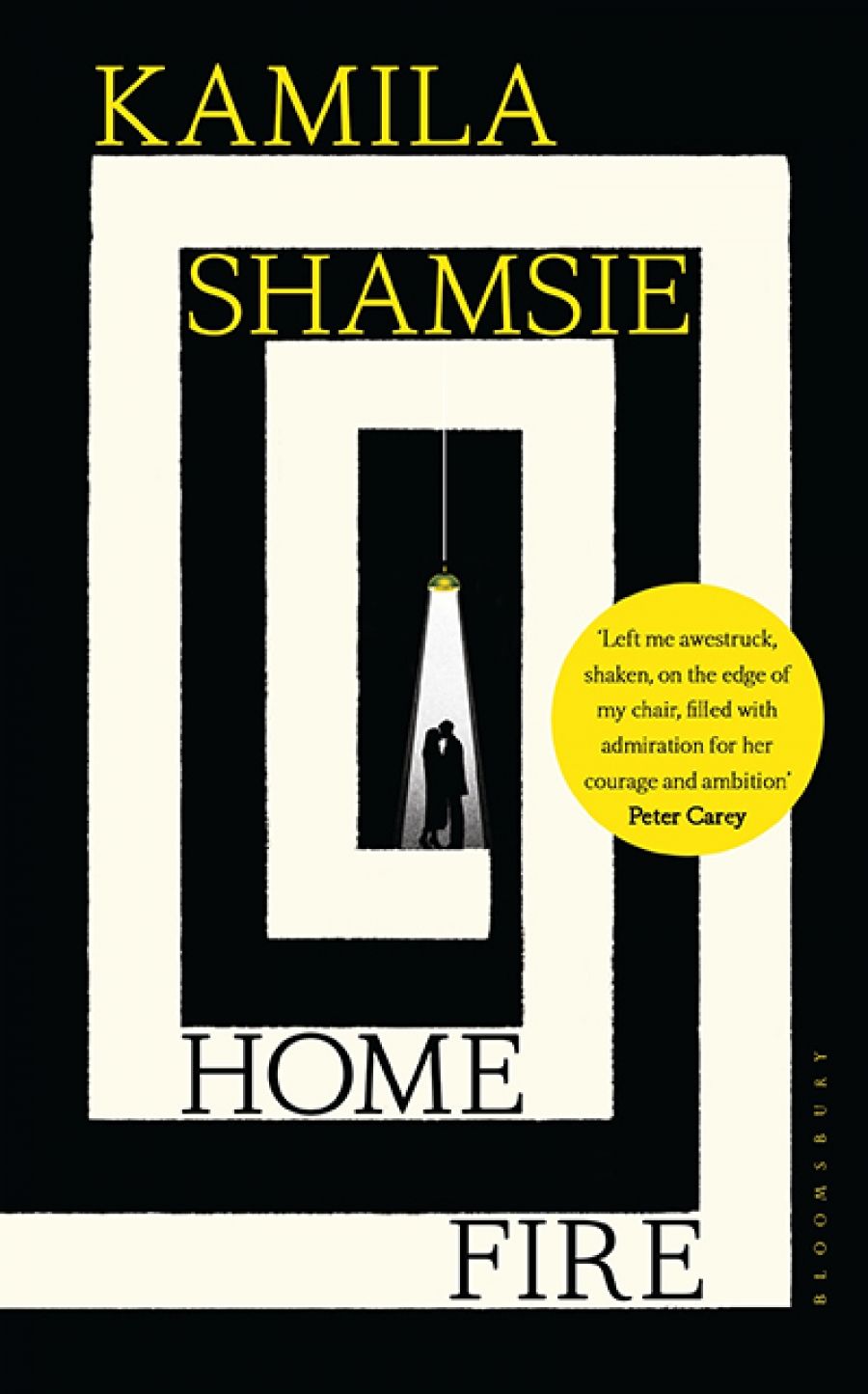
- Free Article: No
- Contents Category: Fiction
- Custom Article Title: Nicole Abadee reviews 'Home Fire' by Kamila Shamsie
- Review Article: Yes
- Online Only: No
- Custom Highlight Text:
Sophocles might not have foreseen when he wrote his tragedy Antigone in 441 BCE that the issues he explored would remain topical in 2017. In the play, Polynices, Antigone’s brother, has died whilst attacking Thebes, his own city, in a bid for the crown. Creon, king of Thebes, has ordered that Polynices’s body be left unburied ...
- Book 1 Title: Home Fire
- Book 1 Biblio: Bloomsbury $24.99 pb, 264 pp, 9781408886786
Kamila Shamsie, who grew up in Pakistan but now lives in London, uses the plot of Antigone as a springboard for her electrifying new novel, Home Fire, which poses questions that are no less urgent. (Shamsie’s seventh novel, Home Fire, was longlisted for the 2017 Man Booker Prize.) Familiarity with Antigone is not necessary to appreciate Home Fire, but readers who do know the play will admire Shamsie’s artistry all the more.
Home Fire opens with the interrogation of Isma Pasha, a London-born Muslim, at Heathrow Airport as she heads to the United States to pursue her studies. She responds patiently to endless questions designed to test her patriotism, on everything from demo- cracy to the Great British Bake Off. Isma has earlier sacrificed her studies to raise her twin siblings, Parvaiz and Aneeka, when their mother died. Their father was an Islamic militant who died en route to Guantánamo Bay. The twins are now nineteen: Aneeka is a law student, ‘who knew everything about her rights and nothing about the fragility of her place in the world’, whilst Parvaiz is drifting. He meets Farooq, an ISIS recruiter, who woos him with the promise of avenging his dead father and persuades him to travel to Syria to work for ISIS’s media unit. After a short time there, a deeply disillusioned Parvaiz wants to return to the United Kingdom.
Isma meanwhile has made it to the United States, where she meets Eamonn, another Pakistani Londoner, whose father, Karamat Lone, is the UK home secretary. Parvaiz’s fate will rest in his hands. Eamonn returns to London, where he falls deeply in love with Aneeka, little realising that this relationship will lead to a massive explosion as his personal life collides with his father’s professional life. Eamonn’s filial loyalty will be pitted against his love for Aneeka. Likewise, Karamat Lone will have to choose between love for his family and political duty.
The narrative unfolds through the eyes of the five main characters, posing difficult questions as it does so. Perhaps the most timely is the question of how a humane society should deal with citizens who have taken up arms against it? Should they forfeit all their their rights, including citizenship? Or is the true touchstone of a civilised society its capacity to forgive? Equally pressing are the issues of when an individual is justified in disobeying an unjust law, and whether there are some laws so fundamental that no man-made law may transcend them.
 Kamila Shamsie (photograph by Zain Mustafa)
Kamila Shamsie (photograph by Zain Mustafa)
Home Fire also brings home forcefully the everyday challenges faced by law-abiding Muslims. Isma is subjected to the humiliating airport interrogation. She and Aneeka are careful about what websites they look at due to the perils of ‘GWM’ – ‘Googling While Muslim’. A Pakistani cousin tells Aneeka, ‘those of us whose passports look like toilet paper to the rest of the world’ spend their lives being careful so they ‘don’t give anyone a reason to reject our visa applications’. What to do? Should Muslims continue to observe their traditional beliefs, like Isma and Aneeka, who wear the hijab and pray each day? Or should they adopt the pragmatic approach of Karamat Lone, who distances himself from his religion to advance his political career, and who preaches the virtues of assimilation to schoolchildren: ‘You are, we are, British ... don’t set yourselves apart in the way you dress, the way you think.’ The day after he says this, Aneeka is spat on in a train.
Sophocles asked many of the same questions two and a half millennia ago. Although Home Fire is in one sense very topical, in another it is timeless. Shamsie’s true skill lies in creating convincing characters and a compelling plot, with a breathtaking conclusion, whilst at the same time tackling issues of enduring relevance. Perhaps the final word should go to Sophocles, on the role of fate in the affairs of humans: ‘Chance raises a man to the heights, chance casts him down, and none can foretell what will be from what is.’


Comments powered by CComment